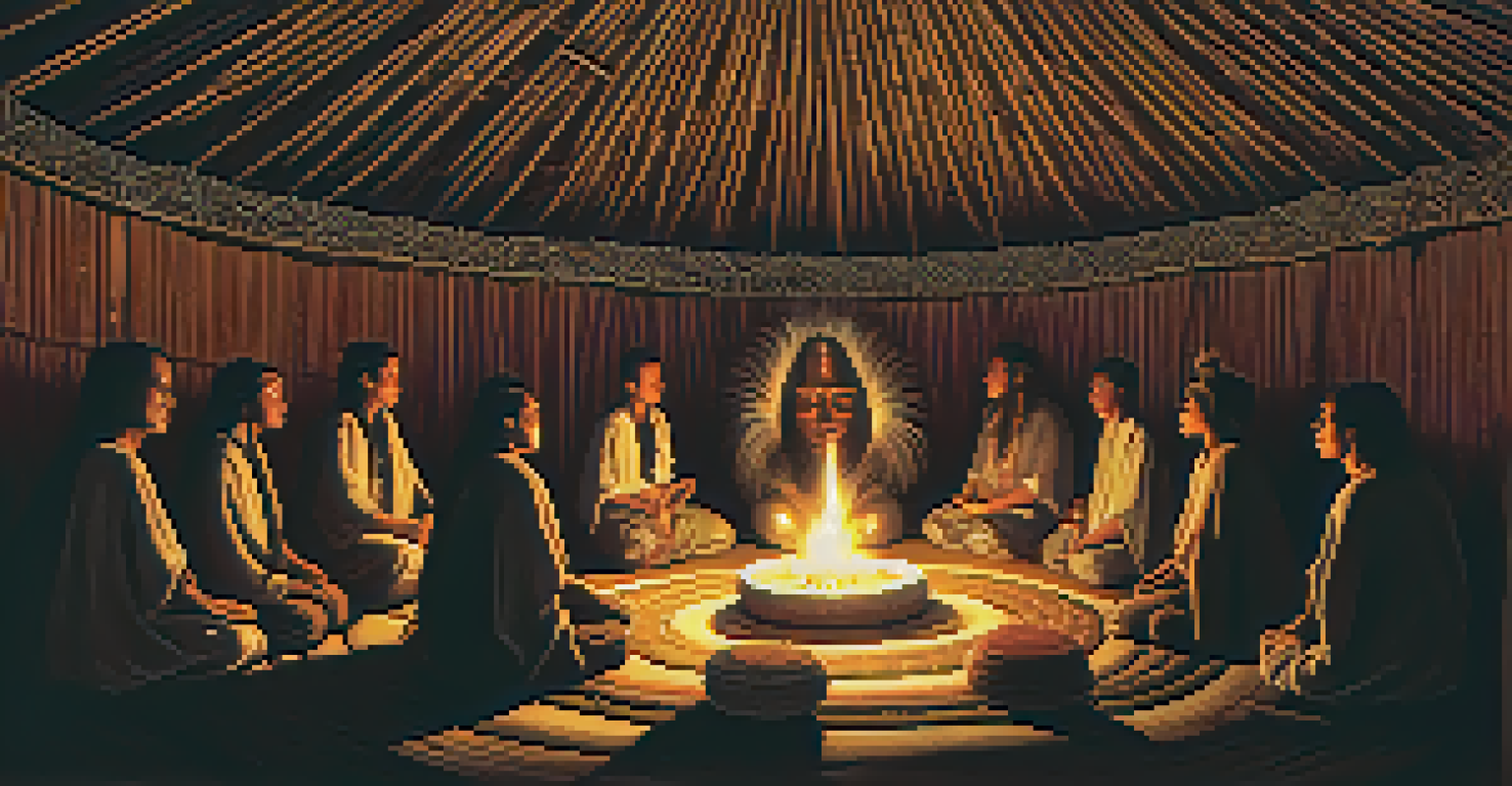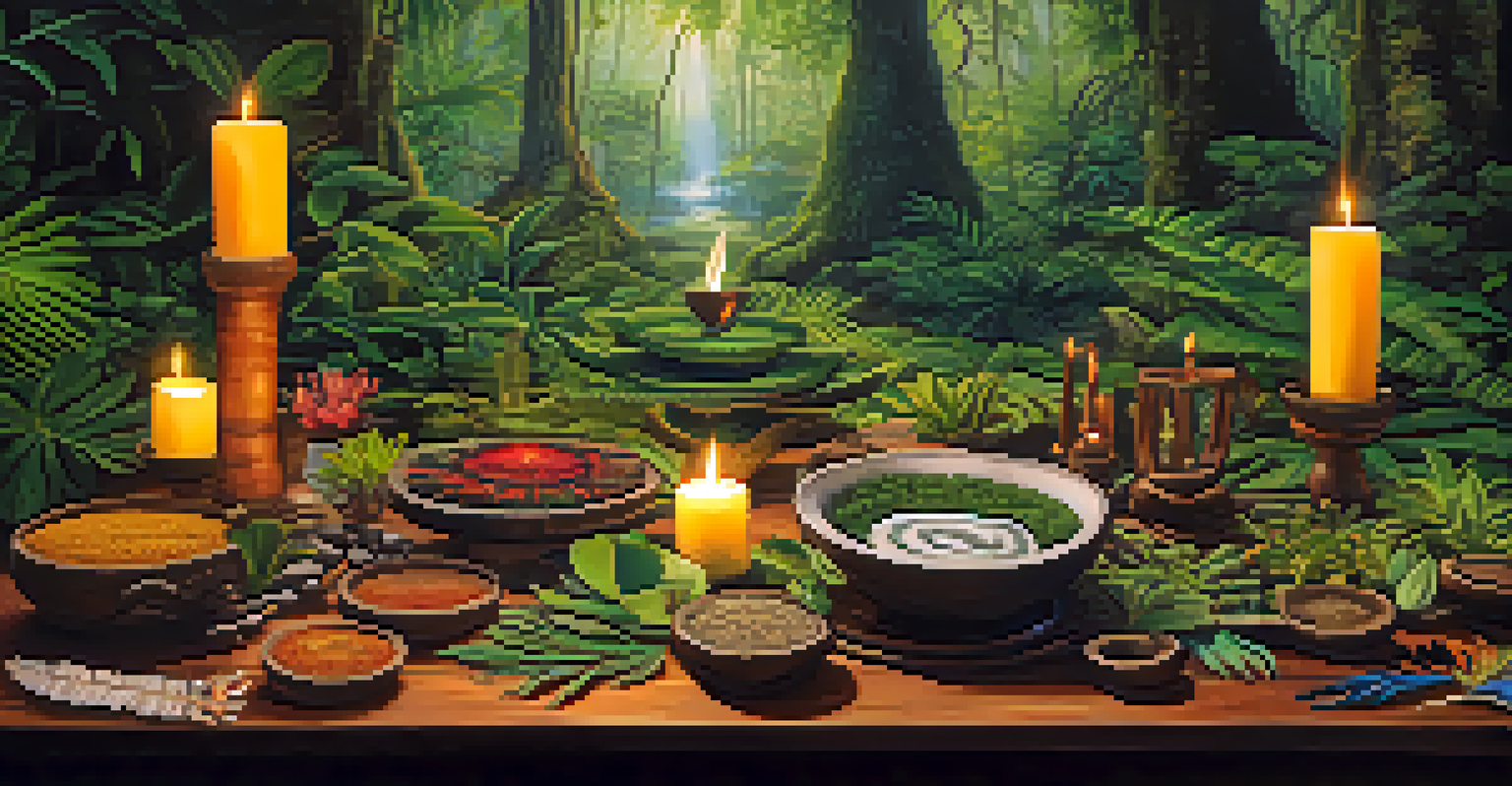Understanding Ayahuasca: Indigenous Perspectives on Healing

What is Ayahuasca? An Overview of Its Origins
Ayahuasca is a powerful brew made from the Banisteriopsis caapi vine and other plants, traditionally used by Indigenous tribes in the Amazon basin. Its origins date back thousands of years, where it has been an integral part of spiritual and healing practices. The term 'ayahuasca' translates to 'vine of the souls' in Quechua, underscoring its role in connecting individuals to the spirit world.
Ayahuasca is a tool for self-discovery and empowerment, allowing individuals to take charge of their healing journeys.
Indigenous shamans, or healers, use Ayahuasca in ceremonies to facilitate deep introspection and healing. The brew induces altered states of consciousness, allowing participants to explore their inner selves and confront personal traumas. This deep connection to nature and spirituality is central to the Ayahuasca experience.
The significance of Ayahuasca goes beyond its psychoactive properties; it embodies the cultural and spiritual beliefs of the communities that have used it for generations. Understanding Ayahuasca requires a look into these rich traditions and the wisdom they impart about healing and connection.
Indigenous Perspectives: Healing Through Ayahuasca
For Indigenous peoples, healing is a holistic process that encompasses the mind, body, and spirit. Ayahuasca ceremonies are not just about consuming the brew; they involve ritualistic elements, such as chanting and drumming, which create a sacred atmosphere for healing. This communal aspect reinforces the idea that healing is a shared journey, not just an individual experience.

Shamans play a pivotal role in these ceremonies, guiding participants through their experiences with care and expertise. They often use specific songs, or 'icaros', to navigate the spiritual realms and invoke the healing energies of the plants. This guidance helps participants process their emotions and experiences during the often intense Ayahuasca journey.
Ayahuasca: Cultural Healing Tradition
Ayahuasca is a sacred brew deeply rooted in Indigenous cultures, used for spiritual healing and community connection.
Moreover, the connection to ancestors and nature is vital in Indigenous healing practices. Participants are encouraged to reflect on their relationships with their environment and lineage, promoting a sense of belonging and interconnectedness that is often lost in modern society.
The Role of Intention in Ayahuasca Ceremonies
Intention is a fundamental aspect of Ayahuasca ceremonies, as it shapes the individual's journey and experience. Before participants consume the brew, they are encouraged to set clear intentions or goals for their healing process. This could range from seeking clarity on a personal issue to addressing deep-seated fears or traumas.
The future of Ayahuasca lies in the balance between honoring its cultural roots and addressing the needs of a modern world seeking healing.
By focusing on intention, participants can better navigate the emotional and spiritual landscapes that unfold during their experience. It acts as a guiding compass, helping individuals stay centered amidst the often overwhelming visions and sensations that Ayahuasca can evoke.
This practice of intentionality underscores the belief that healing is an active process, requiring both openness and commitment from the participant. In this way, Ayahuasca becomes a tool for self-discovery and empowerment, allowing individuals to take charge of their healing journeys.
Cultural Significance: Ayahuasca Beyond Healing
Ayahuasca holds immense cultural significance within Indigenous communities, serving as a bridge between the physical and spiritual worlds. Beyond its healing properties, the brew is integral to rituals, ceremonies, and community gatherings, fostering social cohesion and shared identity among participants. This cultural context enriches the Ayahuasca experience, making it more than just a personal journey.
Through storytelling and oral traditions, Indigenous peoples pass down the knowledge and practices surrounding Ayahuasca to younger generations. This transmission of wisdom ensures that the spiritual and cultural heritage remains alive, allowing communities to maintain their identity in the face of modernization.
Intentions Shape Ayahuasca Journeys
Setting clear intentions before participating in Ayahuasca ceremonies is crucial for guiding personal healing experiences.
Furthermore, the global interest in Ayahuasca has sparked discussions about cultural appropriation and the ethical considerations surrounding its use outside Indigenous contexts. It’s crucial to approach Ayahuasca with respect and understanding of its cultural roots, acknowledging the communities that have preserved its significance for centuries.
Scientific Perspectives: Research on Ayahuasca’s Effects
In recent years, there has been a surge of scientific interest in Ayahuasca, with researchers exploring its effects on mental health and well-being. Studies have shown promising results, indicating that Ayahuasca may alleviate symptoms of depression, anxiety, and PTSD. These findings align with the traditional uses of Ayahuasca for psychological healing, bridging the gap between Indigenous knowledge and contemporary science.
However, it's important to approach this research with caution. The effects of Ayahuasca can vary greatly from person to person, influenced by factors such as dosage, setting, and individual psychological backgrounds. While many report transformative experiences, others may encounter challenging or distressing visions, underscoring the need for proper guidance and preparation.
As science continues to explore the therapeutic potential of Ayahuasca, it also raises questions about the commercialization of this sacred brew. Ensuring that Indigenous communities benefit from the research and that their traditions are respected is paramount in the ongoing dialogue surrounding Ayahuasca.
Navigating Modern Ayahuasca Retreats
In recent years, Ayahuasca retreats have gained popularity, attracting individuals seeking healing and spiritual growth. However, navigating these modern retreats requires careful consideration. Potential participants should research the retreat center, the facilitators’ experience, and the safety protocols in place to ensure a respectful and supportive environment.
It's essential to understand that not all retreats adhere to the same ethical standards or respect the cultural significance of Ayahuasca. Some may prioritize profit over the well-being of participants and the communities that have nurtured this tradition for generations. Engaging with retreats that prioritize cultural integrity and community involvement is crucial for an authentic experience.
Ethical Considerations in Retreats
Navigating modern Ayahuasca retreats requires mindfulness and respect for cultural integrity to ensure an authentic experience.
Moreover, participants should approach their journey with mindfulness and respect, recognizing that Ayahuasca is not a panacea but a tool for self-exploration and healing. Being prepared for the emotional and physical challenges that may arise during the retreat can lead to a more fulfilling and transformative experience.
The Future of Ayahuasca: Preservation and Challenges
As interest in Ayahuasca continues to grow globally, the future of this sacred brew faces both opportunities and challenges. On one hand, increased awareness can promote the preservation of Indigenous cultures and practices, fostering respect for the wisdom these communities possess. On the other hand, the commercialization of Ayahuasca raises concerns about exploitation and the dilution of traditional practices.
Indigenous leaders and advocates stress the importance of protecting their knowledge and ensuring that any sharing of Ayahuasca is done ethically and respectfully. This includes establishing guidelines for those who wish to engage with the brew outside its traditional context, promoting cultural sensitivity and understanding.

Ultimately, the future of Ayahuasca lies in the balance between honoring its cultural roots and addressing the needs of a modern world seeking healing. By fostering respectful dialogue and collaboration, we can ensure that Ayahuasca remains a powerful tool for healing while preserving the rich traditions of the Indigenous communities that have safeguarded it for centuries.